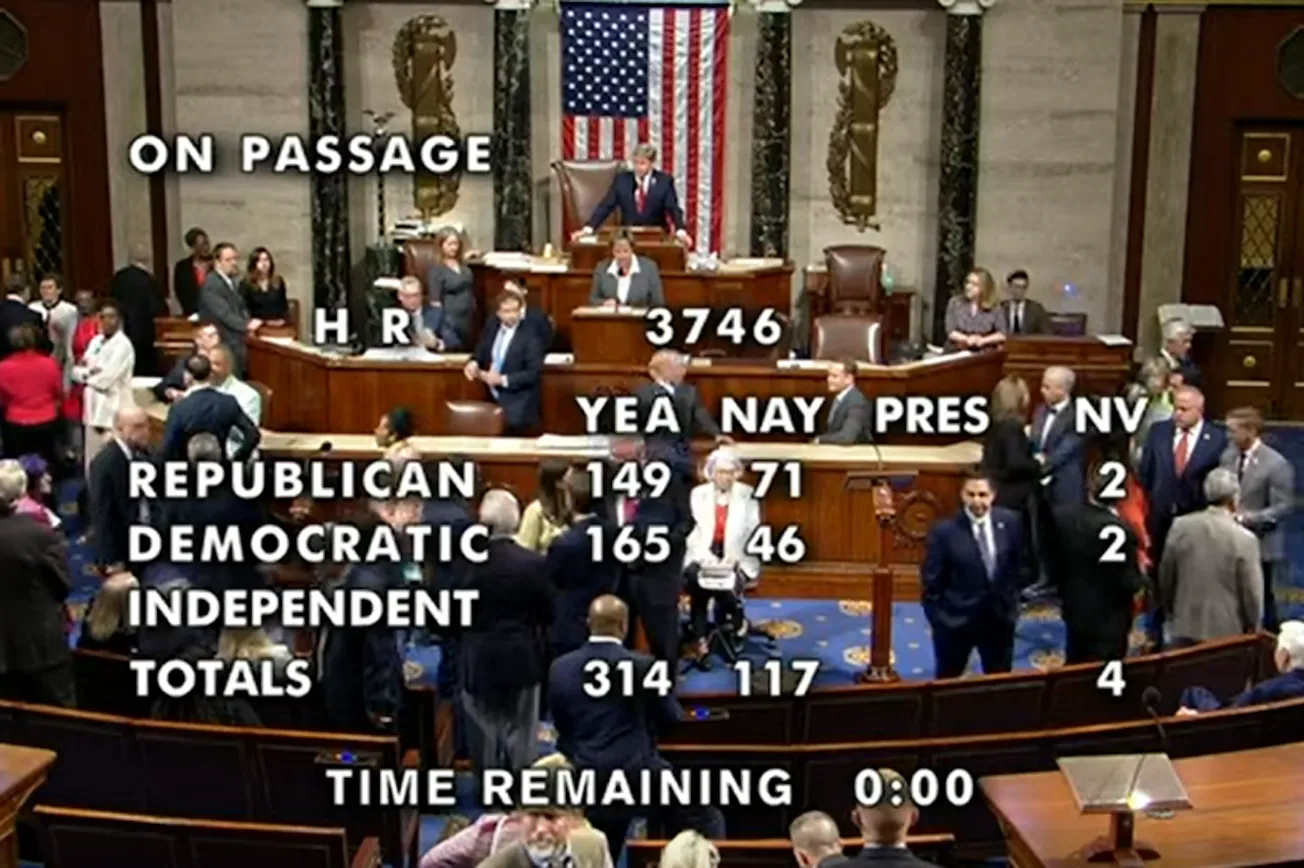Last night, the House voted overwhelmingly (314-117) to pass the Biden-McCarthy budget bill. Nearly 71 Republicans defected from supporting their leader, an ominous outcome that signals trouble for Speaker McCarthy. (If the revolt continues, McCarthy could even lose his position for which he fought so hard.)
The two leaders pulled a clever trick on the American people that most in the media never covered. Included in the bill was a provision to give the Treasury a "blank check" until January 2025, days from the inauguration of the 47th President.
In our editorial on May 30, we pointed out that Speaker McCarthy caved to President Biden by agreeing to unconditionally raise the debt ceiling to whatever amount the Treasury needs. We were critical of McCarthy's decision to not stipulate the increase of the debt ceiling by a fixed dollar amount, as has always been the case and is Congress's constitutional role, and negotiate policy victories for Americans, such as entitlement, tax, and spending reform.
What does the Constitution say regarding the debt ceiling?
The original United States Constitution holds Congress responsible for all money-related matters. The other two branches of government - the Executive and the Courts - are subservient to Congress in this regard.
Article I, Section 8. "The Congress shall have the Power to lay and collect Taxes, Duties, Imposts, and Excises, to pay the Debts and provide for the common Defence and general Welfare of the United States, but all Duties, Imposts, and Excises shall be uniform throughout the United States; To borrow Money on the credit of the United States; To coin Money, regulate the Value thereof and of foreign Coin."
Congress also controls the purse strings through the Appropriations Clause and is uniquely responsible for approving a budget.
Article I, Section 9, Cl 7. "No Money shall be drawn from the Treasury, but in Consequence of Appropriations made by Law; and a regular Statement and Account of the Receipts and Expenditures of all public Money shall be published from time to time."
As Josh Chafetz, a Professor of Law at Cornell Law School, testified in front of Congress in March 2020, these provisions were designed to make it absolutely clear that Congress is the principal decision-maker for how the money will be spent. "The President may appoint the Secretary of the Treasury (with the advice and consent of the Senate), but the Secretary is constitutionally forbidden from disbursing a single dime unless they can point to some enacted law authorizing the expenditure."
The Biden-McCarthy debt bill violates the spirit of our Founding Fathers by delegating to Janet Yellen, an appointed officer in the Executive Branch, vast powers to decide how to spend well into January 2025. The budget, of course, limits the secretary somewhat. Still, President Biden can always assert emergency powers to spend and then go to Congress to receive appropriations approval after the fact. But now, Biden wouldn't have to go to Congress to seek a debt limit increase.
While presidents of both parties have consistently spent funds outside of what budgets allowed them to - think pandemics, hurricanes, and wars - Congress always had a say in limiting their borrowing through the debt ceiling. In each case below, Congress specified the new limit and the additional amount the Treasury could borrow.
- May 19, 2013. New Debt Ceiling: $16.699 trillion.
- February 7, 2014. New Debt Ceiling: $17.212 trillion.
- March 15, 2015. New Debt Ceiling: $18.113 trillion.
- March 15, 2017. New Debt Ceiling: $19.847 trillion.
- March 1, 2019. New Debt Ceiling: $22.030 trillion.
- July 31, 2021. New Debt Ceiling: $28.500 trillion.
- December 16, 2021. New Debt Ceiling: $31.500 trillion.
Covid attacked America in March 2020, when the total debt was about $20 trillion. Since then, America has taken on new debt of over $11 trillion, with three debt ceiling votes held with President Biden in office, the highest number in any presidential term. In January 2023, Secretary Yellen warned us that the Treasury was approaching the $31.5 trillion limit and was resorting to "emergency measures," triggering the drama over the last four months that led to last night's vote.
The latest vote engineered by the Biden-McCarthy bill is a huge victory for reckless spending because it specifies no numeric debt ceiling.
The media is cheering the vote as a win because the alternative was a debt default by the United States, something that could easily have been avoided by a vote to provide $500 billion in a new debt limit vote while policy positions could be addressed. Instead, the vote is a clear loss for the American people because Washington's addiction to spending will continue with no constraints on the horizon. The Treasury can borrow whatever amount it wants - "as much as it needs" until January 2025, as long as it can cook up an emergency. Ukraine must be rejoicing at last night's vote. After all, Washington has always been an expert at finding an emergency when it needs one.
The rank and file worked tirelessly to put Republicans in control of the House, not to capitulate to Biden on the most critical vote and give him a blank check to spend until January 2025. Mark our words: unleashing this spending spree will undoubtedly guarantee stagflation. We will dearly pay for it. Americans deserve better than this.
Like our insights? Show your support by becoming a paid subscriber!









